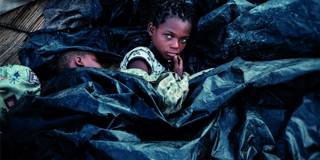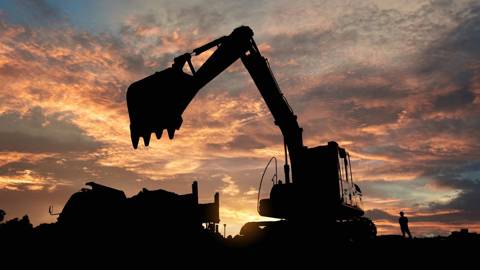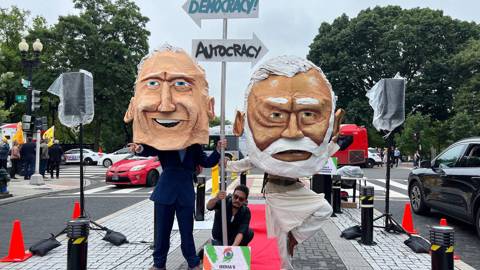Increasingly extreme weather is not only adding to the vulnerability of the world’s poorest communities, but is also hitting developing countries’ bottom lines, making it more difficult for them to invest in resilience. If the Global North is serious about climate justice, it must step in to break this vicious cycle.
LILONGWE – Africa is on the front lines of climate change. In what has become a dangerous vicious cycle, extreme weather is not only adding to the vulnerability of the world’s poorest communities, but also hitting countries’ bottom lines, making it more difficult for them to invest in resilience.
Worse, Africa has suffered a double whammy. Like others across the Global South, my own country, Malawi, already had its natural resources exploited by Western powers as they pursued industrialization and unsustainable levels of production and consumption. While advanced economies contributed the most to climate change, developing countries are now bearing a disproportionate share of its costs.
Earlier this year, Malawi suffered one of its worst tropical cyclones ever. Cyclone Freddy caused extreme rainfall, flooding, and catastrophic mudslides. The most extreme rainfall was in Nkulambe, Phalombe, where 42.5 inches (108 centimeters) fell in just four days. That is more than the area normally receives in a year. Some 2.5 million people were affected, with more than 659,278 people displaced, 679 dead, 537 missing, and 2,186 injured.
Freddy has already cost the country $546.5 million in social and health costs, damaged infrastructure, and disrupted production. And the bill for recovery and reconstruction is estimated to be $764 million. Nor was this some one-off event. Extreme weather is becoming increasingly frequent and severe, with Malawi enduring more than 50 hydrometeorological disasters – including floods, landslides, droughts, and storms like Freddy – since 1980. Severe rainfall has caused around 25 disasters in the last decade alone.
Malawi now ranks in the top five countries most affected by extreme weather events, according to the Global Climate Risk Index. Hence, under a business-as-usual scenario, the World Bank estimates that climate-driven damages could cost Malawi up to 20% of GDP by 2040. Moreover, the repeated cost of rebuilding infrastructure will divert scarce resources from other development needs, such as health care and education. With a national poverty rate of 50.7% (when last measured in 2019), the impact on Malawi’s poorest could be catastrophic.
For these reasons, climate adaptation is a top priority for African countries. Yet it has been repeatedly overlooked, because richer countries tend to focus primarily on mitigation (emissions reductions). Although international financing for adaptation measures in developing countries reached $29 billion in 2020 – representing a 4% increase from 2019, and 34% of all climate finance – that figure is still 5-10 times below estimated needs. Worse, the United Nations Environment Programme’s latest assessment finds that the adaptation financing gap has continued to widen.
Clearly, advanced economies must finally follow through on their 2009 commitment to provide at least $100 billion in climate financing per year to developing countries. Those funds must be delivered in full, and without fail, to the poorest communities, so that they can achieve some quick wins in their efforts to adapt to climate change.
To its credit, the West has largely taken responsibility for global warming and recognized the principle of climate justice in its commitments. But now it needs to focus on the mechanics of financing programs and initiatives to help vulnerable rural communities immediately. Climate justice for the poorest will in turn boost environmental protection. Front-line communities will be effective environmental stewards – for example, by reducing or stopping the deforestation associated with charcoal production – only if they are economically secure.
Climate finance should be directed toward programs that bring about benefits for communities and the environment at the same time. For example, the Community Development Initiative that I established is working on an integrated food-security, financial-sustainability, and environmental-management project in central Malawi, in partnership with various institutions from the Global North. So far, we have provided agricultural inputs like seeds and fertilizer to subsistence farmers, resulting in an eightfold increase in this year’s harvest, compared to previous years. We are also providing communities with stoves for clean cooking and financing infrastructure such as modern houses, a health clinic, and a school.
Through this holistic approach, we hope to transform entire communities, rather than merely allowing them to keep up with mounting risks. When communities are empowered, they can become the agents of sustainable environmental management that we need. Such projects are vital in a country where 85% of the population live in rural areas, surviving on less than $2 per day. Malawi has one of the world’s highest rates of food insecurity.
Moreover, this troubling picture does not even account for the loss and damage (L&D) from climate-driven disasters. In the case of Cyclone Freddy, staple crops such as maize, rice, and tubers were devastated, with the agricultural sector accounting for 46% of the estimated GDP loss.
Countries like Malawi need to make significant investments in resilience, but we cannot do it alone. As matters stand, Malawi is more than $2.5 billion in debt, much of it owed to Western banks. Spending additional money on disaster response will push us – and many other countries like us –further into the red.
At last year’s United Nations Climate Change Conference in Egypt (COP27), rich countries promised to create a new global fund to pay for L&D. That funding urgently needs to be delivered, alongside the implementation of many other adaptation measures. Adaptation finance should be used to catalyze investments in locally led initiatives, so that communities on the front line of the climate crisis can afford to pay to build their own resilience and cover the costs of post-disaster recoveries.
Rich countries must not drag their feet in making the new fund operational. Hashing out those details should be a top priority at COP28 in Dubai. The last thing we need is more excuses and technocratic explanations for inaction. One promising proposal is to establish a global carbon-based taxation mechanism targeting the corporations that are fueling the climate crisis, with 50% of profits ring-fenced for the L&D fund. Millions of people in Malawi, across Africa, and around the world have waited years for this. Now it is the time to deliver.






LILONGWE – Africa is on the front lines of climate change. In what has become a dangerous vicious cycle, extreme weather is not only adding to the vulnerability of the world’s poorest communities, but also hitting countries’ bottom lines, making it more difficult for them to invest in resilience.
Worse, Africa has suffered a double whammy. Like others across the Global South, my own country, Malawi, already had its natural resources exploited by Western powers as they pursued industrialization and unsustainable levels of production and consumption. While advanced economies contributed the most to climate change, developing countries are now bearing a disproportionate share of its costs.
Earlier this year, Malawi suffered one of its worst tropical cyclones ever. Cyclone Freddy caused extreme rainfall, flooding, and catastrophic mudslides. The most extreme rainfall was in Nkulambe, Phalombe, where 42.5 inches (108 centimeters) fell in just four days. That is more than the area normally receives in a year. Some 2.5 million people were affected, with more than 659,278 people displaced, 679 dead, 537 missing, and 2,186 injured.
Freddy has already cost the country $546.5 million in social and health costs, damaged infrastructure, and disrupted production. And the bill for recovery and reconstruction is estimated to be $764 million. Nor was this some one-off event. Extreme weather is becoming increasingly frequent and severe, with Malawi enduring more than 50 hydrometeorological disasters – including floods, landslides, droughts, and storms like Freddy – since 1980. Severe rainfall has caused around 25 disasters in the last decade alone.
Malawi now ranks in the top five countries most affected by extreme weather events, according to the Global Climate Risk Index. Hence, under a business-as-usual scenario, the World Bank estimates that climate-driven damages could cost Malawi up to 20% of GDP by 2040. Moreover, the repeated cost of rebuilding infrastructure will divert scarce resources from other development needs, such as health care and education. With a national poverty rate of 50.7% (when last measured in 2019), the impact on Malawi’s poorest could be catastrophic.
For these reasons, climate adaptation is a top priority for African countries. Yet it has been repeatedly overlooked, because richer countries tend to focus primarily on mitigation (emissions reductions). Although international financing for adaptation measures in developing countries reached $29 billion in 2020 – representing a 4% increase from 2019, and 34% of all climate finance – that figure is still 5-10 times below estimated needs. Worse, the United Nations Environment Programme’s latest assessment finds that the adaptation financing gap has continued to widen.
SPRING SALE: Save 40% on all new Digital or Digital Plus subscriptions
Subscribe now to gain greater access to Project Syndicate – including every commentary and our entire On Point suite of subscriber-exclusive content – starting at just $49.99.
Subscribe Now
Clearly, advanced economies must finally follow through on their 2009 commitment to provide at least $100 billion in climate financing per year to developing countries. Those funds must be delivered in full, and without fail, to the poorest communities, so that they can achieve some quick wins in their efforts to adapt to climate change.
To its credit, the West has largely taken responsibility for global warming and recognized the principle of climate justice in its commitments. But now it needs to focus on the mechanics of financing programs and initiatives to help vulnerable rural communities immediately. Climate justice for the poorest will in turn boost environmental protection. Front-line communities will be effective environmental stewards – for example, by reducing or stopping the deforestation associated with charcoal production – only if they are economically secure.
Climate finance should be directed toward programs that bring about benefits for communities and the environment at the same time. For example, the Community Development Initiative that I established is working on an integrated food-security, financial-sustainability, and environmental-management project in central Malawi, in partnership with various institutions from the Global North. So far, we have provided agricultural inputs like seeds and fertilizer to subsistence farmers, resulting in an eightfold increase in this year’s harvest, compared to previous years. We are also providing communities with stoves for clean cooking and financing infrastructure such as modern houses, a health clinic, and a school.
Through this holistic approach, we hope to transform entire communities, rather than merely allowing them to keep up with mounting risks. When communities are empowered, they can become the agents of sustainable environmental management that we need. Such projects are vital in a country where 85% of the population live in rural areas, surviving on less than $2 per day. Malawi has one of the world’s highest rates of food insecurity.
Moreover, this troubling picture does not even account for the loss and damage (L&D) from climate-driven disasters. In the case of Cyclone Freddy, staple crops such as maize, rice, and tubers were devastated, with the agricultural sector accounting for 46% of the estimated GDP loss.
Countries like Malawi need to make significant investments in resilience, but we cannot do it alone. As matters stand, Malawi is more than $2.5 billion in debt, much of it owed to Western banks. Spending additional money on disaster response will push us – and many other countries like us –further into the red.
At last year’s United Nations Climate Change Conference in Egypt (COP27), rich countries promised to create a new global fund to pay for L&D. That funding urgently needs to be delivered, alongside the implementation of many other adaptation measures. Adaptation finance should be used to catalyze investments in locally led initiatives, so that communities on the front line of the climate crisis can afford to pay to build their own resilience and cover the costs of post-disaster recoveries.
Rich countries must not drag their feet in making the new fund operational. Hashing out those details should be a top priority at COP28 in Dubai. The last thing we need is more excuses and technocratic explanations for inaction. One promising proposal is to establish a global carbon-based taxation mechanism targeting the corporations that are fueling the climate crisis, with 50% of profits ring-fenced for the L&D fund. Millions of people in Malawi, across Africa, and around the world have waited years for this. Now it is the time to deliver.